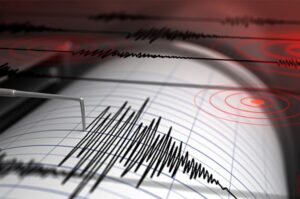
After six years of battling the aftermath of the landslide, the Imamović family of six is finally safe in a new home built with the support of the European Union.
“It’s great here, it’s closer for children to go to school, everything is within reach, if someone calls me for work, it’s closer for me to get to the asphalt road in less than 200 meters”, says Jasmin Imamović who moved into a new house together with his parents, wife and two children six months ago.
The newly built house is two kilometres away from the old family home in the village of Lipovice, Kalesija municipality, which is gradually deteriorating as a result of catastrophic landslides of 2014. The house, built in 1987 by today’s 76-year-old Suljo Imamović, did not withstand the force of the constantly moving ground.
Threatening cracks, which run across the walls even after many years of attempts at repair, served as an unrelenting reminder for this family that there is no permanent solution. The landslide that took away their shack with firewood was quite telling in that they had no other options but to move out.
“The house still stands, but everything around it is elevated, the terrain is inaccessible. It’s as if there was some digging, there are cracks in the house”, explains Hasida Imamović, Jasmin’s wife. “They also had to turn off the water, because of the strong pressure, so not to make it even worse.”
The solution to their situation came thanks to the EU-funded Flood Recovery Programme that built a new home for this family on a land plot in Sarači.
“It’s easier here, it’s closer to the school for the children, some twenty minutes to school, and up there it was up to an hour,” says the Imamović family, adding: “We can still cultivate the land up there. We have a garden to meet our own needs, and we brought animals here.”
Imamović’s new home consists of a kitchen with a living room, two bedrooms, a bathroom and a hallway. As with other newly built houses, the Imamović family has also the energy efficiency measures applied, which will allow for the rational use of energy and significantly reduce the overhead costs for the household.
In order to support families in recovering from the aftermath of floods and landslides, the Programme also designed economic support packages, and this family was provided with a milling machine that Jasmin uses seasonally to cultivate his land, but also for others, thus helping him make some earning.
“I’m a wageworker from time to time. I’d occasionally mill something to make money. And we are very satisfied with the house”, says Jasmin. “I wasn’t always in such a difficult situation, my father was a skilled worker, and I was the first here to pass the exams for the truck driver,” he added. “But thank God and the people that I got out of there because of the children. And I couldn’t have built this myself.”
With the small pension that Suljo Imamović earned as a bricklayer and the income generated from working with cattle and on the land, this family of six finds ways to build a new life in Sarači. Aimed at supporting the two of their children in school, they work as hard as they can while getting used to the new environment. They say, however, that it is easier now that they are not too far from their village where they can still cultivate their land.
“I’m grateful to those who built this house, it couldn’t have been built from the little pension I have”, says Suljo, and his wife Fikreta remembers how difficult it was for her to come to Sarači after more than four decades of living in Lipovica.
“We lived there for so many years. When we set off to leave the home there, it felt as if my heart was to break. We spent 45 years there,” she said.
Next to the old house is an orchard of about an acre and a half that the Imamović family still uses and visits their fields and forests in Lipovica. Plums, apples, walnuts, pears and cherries still grow.
“All is in vain if you are not safe”, concludes Jasmin, and Hasida adds: “Those who lived through it will never forget. Those who did not, won’t even remember”.
Flood Recovery – Housing Interventions Programme provides support for self-sustainable recovery through rehabilitation and construction of housing units and the economic empowerment of socially and economically vulnerable whose homes were damaged or destroyed in the 2014 floods and landslides. The Programme, valued at 15 million euro, is funded by the European Union with 12.5 million euro in co-operation with the Government of the Federation of BiH, the Government of Republika Srpska, partner municipalities and cities and UNDP in BiH.
The programme is implemented by UNDP in BiH, jointly with the International Organization for Migration (IOM), Arbeiter-Samariter-Bund (ASB), Hilfswerk International (HWI) and partner municipalities and cities.



















